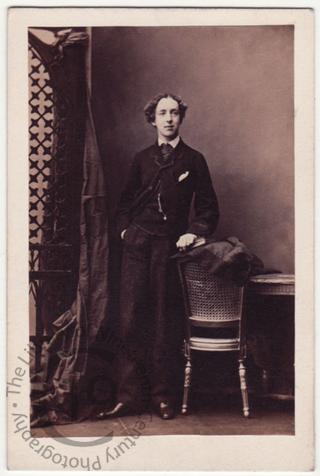
Hon Lewis Wingfield
A younger son of Viscount Powerscourt, the Honourable Lewis Strange Wingfield was educated at Eton and at Bonn. He was originally intended for the diplomatic service but he chose instead the stage and in 1865 made his debut playing the goddess Minerva as an elderly spinster in F.C. Burnand’s burlesque Ixion. (Elderly spinsters frequently featured in Victorian humour.)
Reviews were mixed. Although one commentator praised his ‘sense of the humorous both in character and action’, another wrote of ‘his idiotic dance in petticoats that might stand for something in competitive examination for admission into the Earlswood Asylum, but as a gentleman’s first bid for the honours of the English stage was a distressing sight to see.’
Less than a fortnight later he was appearing in a production of Othello at the Haymarket, where one critic though he ‘impersonated Roderigo precisely as a school girl in male attire would have performed it.’
Wingfield soon abandoned his theatrical aspirations and by 1871 he was tending the wounded of Paris during its two sieges. He seems to have been one of those astonishing Victorian dynamos, for he later followed a varied career as an artist, a doctor and an author.
According to his entry in the Dictionary of National Biography, ‘[h]e led a varied career, being capricious and unstable, never remaining with any one activity for very long and never reaching the top rank in any of them […] Wingfield has left many examples of his eccentric behaviour, such as going to the Derby as a "negro minstrel", spending nights in a workhouse and pauper lodgings, and becoming an attendant in a madhouse. He travelled in various parts of the East and was one of the first Englishmen to journey in the interior of China.’
Although Wingfield was married in 1868 to Cecilia Emma Fitzpatrick, fourth daughter of the 1st Baron Castletown, it seems more than likely that he was gay. In April 1879 several newspapers reported on a 'Strange Charge of Watch Stealing'. According to one article, Lewis 'fell in' with a soldier in Hyde Park one morning but later accused the soldier of stealing his watch. The accused, in turn, made 'disgraceful allegations' against Lewis. Needless to say, the court sided with the peer's son and the unfortunate soldier got five years hard labour. Hyde Park was notorious well into the twentieth century as a cruising area where wealthy homosexuals could meet a 'bit of scarlet' eager to earn a few extra shillings, so it's not difficult to read between the lines and grasp the real story behind the encounter.
Lewis Wingfield died in London at 14 Montague Place on 12 November 1891, aged 51, and was buried in Kensal Green cemetery.
Photographed by Camille Silvy on 28 March 1861.
Code: 122095




